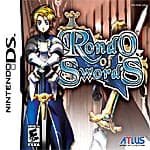Setting The Bar High For Strategy Games To Come
March 4, 2008 – Fire Emblem is easily one of my top five favorite video game series ever, and it’s definitely what really got me into the niche genre known as strategy role playing games, or SRPGs for short. And I’m not the only one — tons of gamers all over the place have fallen in love with the addictive, customizable, and fantastically fun genre. Now, Atlus is bringing to North America a DS title named Rondo of Swords. SRPG fans, prepare yourself for yet another addicting, exciting game to eat away your free time.

One of the biggest problems nowadays with SRPGs, and one that Rondo of Swords clearly attempts to rectify, is that they all tend to be very similar. It seems to me at least (along with a lot of other fans of the genre) that the majority of games tend to go down two basic paths. It could be very similar to Fire Emblem, which is focused more on story and faster-paced action, or Final Fantasy Tactics Advance, with far more options but featuring a slower-paced gameplay mechanic as a result. Well, Rondo of Swords is neither. Thanks to several really awesome gameplay innovations, Rondo of Swords is looking to set a new standard for SRPGs to come.
Probably the biggest innovation that Rondo of Swords will feature is the fact that rather than employing the traditional grid-based-combat system, where you position your character adjacent to an enemy and choose to attack, Rondo of Swords consolidates moving and attacking into one action. You indicate a path for each character, and they’ll move there. Along the way, if any foes get in the way, battles are automatically initiated (featuring scenes full of graphical quality that handheld SRPG fans are already used to). And of course, your enemies do the same thing, but in a successful attempt to make sure that things don’t get too crazy, each unit has a set amount of Action Points. One the APs are used up, that character is done for the turn. So naturally, a strategy arises in deciding what’s the best way to utilize a character’s points on any given turn. Do you make a break for as many enemies as possible, or do you venture out and then return to your starting spot to ensure a defensive position?

But the strategy does not only lie in that, of course. With the addition of this battle system, another issue to consider is how to space your units. Units can get stat boosts and HP replenishes when they’re in range of another character, plus it’s always handy to have all of your soldiers working together. But on the other hand, a strong foe could run quickly through your army and do significant damage to several units. Balancing the risk and return of character placing ensures plentiful strategy and also allows players to really customize the game to their playing style — but of course, that’s no abnormality in RPGs. But this type of game is known for its depth, and Rondo of Swords doesn’t shirk. While the dominant gameplay mechanic isn’t that difficult to get a hold of, the title will definitely throw a few curveballs your way. For example, some characters have the ability to resist units from passing through them — such an ability is also often present on your foe’s side. But walls and mounted units, as well as the magic-users that you will acquire throughout the game, continue to push the game up a notch.

It’s important not to lose sight of the fact that RPG is an obvious part of an SRPG. And Rondo of Swords definitely features tons of RPG staples. One main one is the presence of experience points, of sorts — called Skill Points in this game. When a character gains Skill Points, you can allocate them to improve certain aspects of that character: Magic, Strength, Defense, and other typical stats present in role-playing titles. Leveling-up is also a large part of Rondo of Swords, as your characters obviously become stronger once that gain a new class. In addition to imbuing this creative with staples of the RPG genre, it also features a few new additions that will surely enhance and deepen the game experience. One that has gotten a good amount of attention is the Errand System. Since you can only have so many units on the battlefield, before a battle you can send out one — or many — of your characters to perform errands, be it engaging in quests to earning some money to purchasing items.
One final mechanic that is worthy of mention is what’s called the Momentum Counter. It’s present with every character, but builds up at different rates. It grows as you engage in combat, and a higher Momentum Counter has two affects: first is that it temporarily increases the strength of that unit. But on the other hand, it also makes enemies more likely to attack that unit. While this could become problematic when trying to level-up a weak character, it can also be used to your advantage by using a powerful unit with a high Momentum Counter to help discourage foes from attacking a weaker ally. All in all, Rondo of Swords is definitely shaping up to be one of the best sleeper titles of 2008. And while it may not get as much attention as, say, Final Fantasy Tactics Advance 2, it seems to be the better option if you’re searching for a title that really marches to its own beat.
Game Features:
